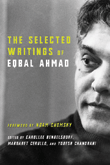
The Selected Writings of Eqbal Ahmad
Eqbal Ahmad; edited by Carollee Bengelsdorf, Margaret Cerullo, and Yogesh Chandrani
Foreword by Noam Chomsky
Columbia University Press, August 2006
"It is a fascinating experience to view major events of the past half century through Eqbal Ahmad's discerning eye."
—Noam Chomsky
"Eqbal Ahmad was perhaps the shrewdest and most original anti-imperialist analyst of the postwar world. Ahmad's themes were always liberation and injustice, or how to achieve the first without reproducing more of the second. Humanity and genuine secularism in this blood-drenched old century of ours had no finer champion."
—Edward Said, author of Orientalism
"Eqbal Ahmad is a brilliant man with brilliant insights. My only complaint about him is that he is not here now, when we need him most."
—Arundhati Roy, author of The God of Small Things
"Ahmad's world outlook transcends nationalist pride, expressing a profound passion for the equal right to dignity of humans in every corner of the globe. His knowledge of world affairs was formidable, coming in part from his personal acquaintance with important political actors on several continents. His style, both in speaking and writing, was dramatic and witty. He was not an armchair analyst, but a participant in some of the most important struggles of our time in Algeria, in Vietnam, in Palestine. He was never bound by a single ideology, always committed to social justice and nonviolence. In short, an exemplary human being."
—Howard Zinn, author of A People's History of the United States
"This collection transports one back to Eqbal's living room, where he is sitting on the floor, talking politics until the early hours of the morning. It beautifully orchestrates the discussion in its excellent organization and in the manner in which the introductions to each section underscore the themes central to Eqbal's thought. Eqbal's commitment to a revolutionary politics that is moral rather than tactical, to fostering a transnational intellectual and political community, has never been more germane. Despite its sorrow at the betrayals of revolutionary struggles, this book is filled with hope in the power of people and ideas to remake history."
—Amrita Basu, professor of political science and women and gender studies, Amherst College
"I've spent much of my adult life, it seems, reading and learning from Eqbal Ahmad. He was a voice of faith and courage-faith in mankind, faith in decency, faith in knowledge and facts, and the courage to always tell truth to power, no matter what the personal risk. In these essays, his legacy, he told us how to deal with Osama bin Laden and his terrorism. We did not listen."
—Seymour M. Hersh, author of Chain of Command: The Road from 9/11 to Abu Ghraib
"For those looking to muster intellectual resources with which to negotiate a way through the War on Terror, Ahmad is a must read."
—Mahmood Mamdani, author of Good Muslim, Bad Muslim
Activist, journalist, and theorist, Eqbal Ahmad (1934—1999) was admired and consulted by revolutionaries and activists as well as policymakers and academics. In articles and columns published in such journals as the Nation, New York Review of Books, Monthly Review, and newspapers in Pakistan and Cairo, Ahmad inspired new ways of thinking about global issues. Whether writing on the rise of militant Islam, the conflict in Kashmir, U.S. involvement in Vietnam, or the cynical logic of Cold War geopolitics, Ahmad offered incisive, passionate, and often prophetic analyses of the major political events and movements of the second half of the twentieth century.
This work is the first to collect Ahmad's writings in a single volume. It reflects his distinct understanding of world politics as well as his profound sense of empathy for those living in poverty and oppression. He was a fierce opponent of imperialism and corruption and advocated democratic transformations in postcolonial and third-world societies. A uniquely perceptive critic of colonialism and U.S. foreign policy, Ahmad was equally vigilant in his criticisms of third-world dictatorships.
Like few other writers, Ahmad's life experiences shaped his political views. He grew up amidst the turmoil of postcolonial India, worked alongside the Algerian FLN in their fight against the French occupation, and later became a prominent spokesperson for peace between Israel and Palestine.
About the Authors
Eqbal Ahmad (1934-1999) taught at the University of Illinois Urbana-Champaign, Cornell University and Hampshire College. He was a fellow at The Institute for Policy Studies and the first director of its overseas affiliate, The Transnational Institute.
Carollee Bengelsdorf is professor of politics at Hampshire College.
Margaret Cerullo is professor of sociology and feminist studies at Hampshire College.
Yogesh Chandrani is a doctoral candidate in anthropology at Columbia University.
Click the title at the top to read Noam Chomsky's Foreword to the book.
2 comments:
Before he died he was trying to start a university in Pakistan. I wish there was more information about what kind of university he was planning, what he expected its curriculum to be, what kind of professors he wanted....basically what he expected the soul of the university to be.
There will be a forum tonignt, Thursday, 28 September.
"Confronting Empire: Eqbal Ahmad's Legacy and the Contemporary Crisis"
with Noam Chomsky, filmmaker Beena Sarwar, Margaret Cerullo and Stuart Schaar
at Harvard University, Ames Courtroom, Austin Hall, 7:30 pm
free and open to the public
Post a Comment